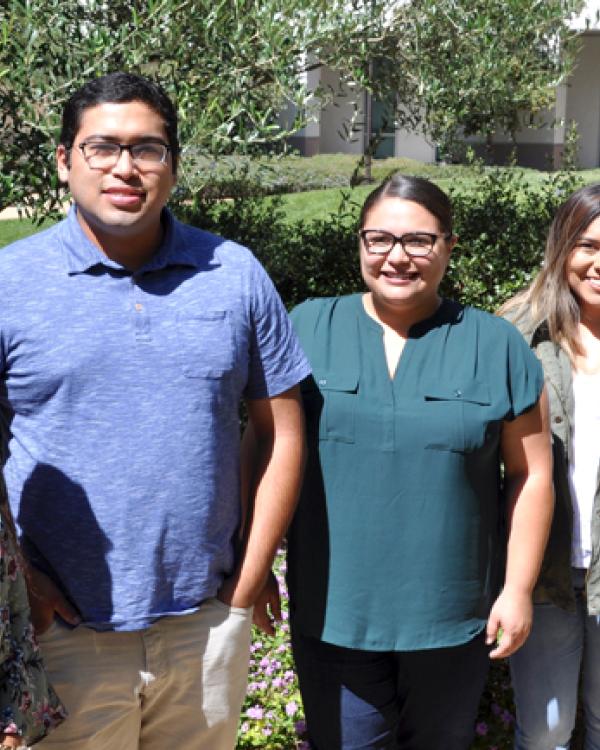
The Department of Education graduate student mentors in the New Heights Program: (l-r) Diana Chagolla, Bertin Solis, Melina Melgarejo, Gabriela Gutierrez, and Tiffany Ibarra (not pictured, Fabian Pacheco)
In Spring 2017, the Chicano Studies Institute initiated a collaboration with the Center for Black Studies Research (CBSR) and Student Affairs Academic Initiatives and put in place a one-quarter mentorship program for sophomores. The New Heights Grad-Undergrad Mentoring Program took 57 sophomores of color—primarily first generation Chicano/Latino students and Black students—and allowed them to work in small groups with graduate students from similar backgrounds to explore the many opportunities available to help them succeed at a research university and reach their educational goals. theGevirtz School mentors were Diana Chagolla, Gabriela Gutierrez, Tiffany Ibarra, Melina Melgarejo, Fabian Pacheco, and Bertin Slois.
The graduate students engaged undergrads from different disciplines (Chicano Studies, Humanities, Global Studies, Anthropology, Psychology, Sociology, and STEM-related fields) in various activities such as resume writing, how to find undergrad research opportunities, how to craft an email to faculty about getting involved in research, and how to ask for letter of recommendation from faculty. The graduate students, all from the Department of Education, also met one-on-one with the undergrads to talk about future career goals. On a post-program survey, the undergrads reported that they were more than satisfied with the mentoring experience.
“I was able to reach out to my mentor and he would get back to me within minutes,” one undergraduate participant wrote. “I really enjoyed having him as a mentor because he really wanted us to believe that graduate school was possible and ensured that we each were able to speak our mind at the group meetings. All my questions were answered.”
The undergrads also reported increased confidence that they could succeed in the UCSB environment and intentions to get involved in research in the future. The graduate students themselves reported that the experience was rewarding and that it improved their confidence that they could mentor students in the future as professors. These trends provide evidence of the value of ethnic-minority graduate-undergraduate student mentoring programs in encouraging first generation undergraduate students to gain research experience, reach out to faculty, and look out for their psychological well-being as well as fostering confidence among first generation Latina/o graduate students.